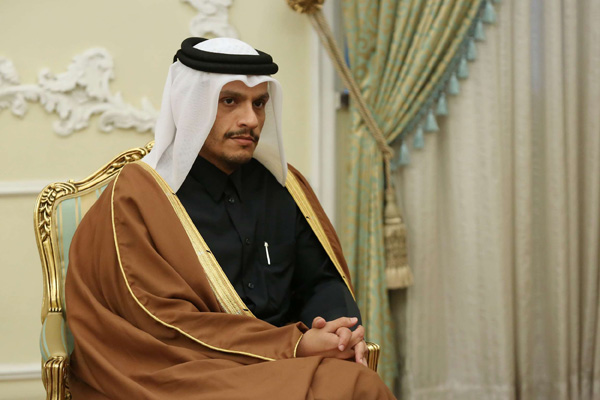
Doha imagines itself in a better negotiating position and willing to play its role as a peacemaker.
As the inauguration of US President-elect Joe Biden approaches, and with his administration’s intention to reopen the gate for negotiations with Iran, Qatar is seeking to position itself as the “number one” mediator in the Middle East between the United States and a number of its enemies or opponents of its policies. In this, Qatar is perhaps hoping to take that role from Oman, but the chances of it succeeding look slim.
There is no reason for Biden to replace Oman with Qatar if a mediator is ever needed.
Qatar is a less palatable option due to its unfriendly relationship with Saudi Arabia and the UAE, both of whom are calling for consultation this time when negotiations on the Iran deal resume.
Doha sees itself as a natural alternative to the Oman in the issue of US negotiations with Iran about the latter’s nuclear file and as a likely candidate for reaching settlements in this file, even though it will certainly clash with Saudi opposition Qatar’s intervention in a file that Riyadh considers an existential issue, especially after the Iranian-sponsored attack on Abqaiq oil facilities.
But for Qatar, this is exactly the important angle it believes it can exploit to pressure Saudi Arabia into accepting a reconciliation formula, especially as the Saudi Kingdom appears today more willing to revise the files of its regional relations in light of Joe Biden’s arrival to the White House, and after the kingdom has had a taste of the serious harm that Doha can inflict in the field of public relations in the West by using human rights files, the killing of Jamal Khashoggi and the war in Yemen.
Qatar’s ambition does not stop at taking over Muscat’s role in any possible negotiations with Iran or in helping to establish a formula for coexistence with the Houthis in Yemen. Rather, analysts close to Doha say that Qatar’s relationship with Turkey and its influence over the rebels in Syria and the pro-government forces in Libya can be exploited to end those long conflicts, especially given the role of mediator it played between the United States and the Taliban in Afghanistan.
Noha Abu al-Dahab, a fellow at the Brookings Doha Centre, said the cornerstone of Qatar’s foreign policy is to serve as a hub for diplomacy.
In the past, “this includes holding informal and formal talks between groups such as Hezbollah and the Lebanese government in 2008, the Taliban and the Afghan government, the latest in 2020, Hamas and Fatah, rebel groups in Darfur and the Sudanese government in 2009. Severing relations with any country was never a typical feature of Qatar’s foreign policy, and I don’t think this will change even under the current circumstances,” she explained.
In 2017, when the boycott against Qatar threatened the supply of basic goods inside the tiny state, Iran was the first to send it supplies of basic necessities and commodities—such as vegetables—and open its ports and airspace for Qatari planes and ships. Even if the boycott came to be lifted, there is still no guarantee that it would not be imposed again. So, it is in Qatar’s interest to keep the Iranian gates open.
Saudi Arabia is concerned that a sectarian foe may develop a nuclear weapon, especially after Iranian cruise missiles and drones easily produced by Tehran and its allies have become part of the realities of power in the Middle East. On top of that, Qatar’s commitment to engaging with the Muslim Brotherhood has gained critical importance to it due to the group’s successes in the “Arab spring” uprisings.
Even during the outbreak of the “Arab spring” upheaval, the local branches of the Muslim Brotherhood were tolerated and eyes were closed on what they were doing. But, all that has changed now. Saudi Arabia, the United Arab Emirates, Egypt and Bahrain have outlawed the Muslim Brotherhood and placed it on their lists of terrorist organisations. So when Saudi Crown Prince Mohammed bin Salman established close relations with the US President’s advisor Jared Kushner and found in Donald Trump an American ally, he tried to mitigate both threats by putting pressure on Qatar.
Nonetheless, as Biden—who has publicly criticised Saudi Arabia and is planning to turn his attention to Iran—takes office, Qatar imagines itself in a better negotiating position and willing to play its role as a peacemaker.
A few days following the killing of Major General Qassem Soleimani, commander of the Quds Force of the Iranian Revolutionary Guard, in an American drone attack in Baghdad early this year, and as tension escalated between the United States and Iran, the Emir of Qatar, Sheikh Tamim bin Hamad Al Thani, travelled to Tehran.
Some analysts pointed out that that visit was evidence of Qatar’s usefulness for the United States.
Andreas Craig from King’s College London considered that the visit of the Emir of Qatar to Teheran came at the request of the United States, and that his role was to advise the Iranian government to exercise restraint.
“The United States had asked the Emir of Qatar to go and mediate to avoid escalating tensions in the Gulf,” Craig said in statements to Foreign Policy magazine.
For her part, Abu al-Dahab revealed that, following Soleimani’s assassination, the Qatari foreign minister went to Iraq with the same message. Qatar’s Foreign Minister Sheikh Mohammed bin Abdulrahman Al Thani travelled to Iraq in an attempt to soothe tensions. As such, Qatar’s approach when it comes to tensions with Iran is to seek de-escalation, not isolation or estrangement.
 Eurasia Press & News
Eurasia Press & News



